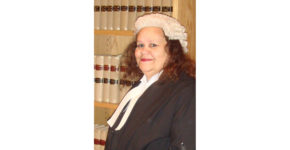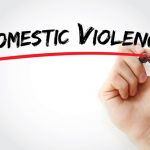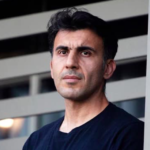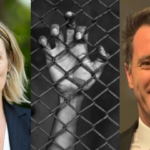Practising Whitefella Law: An Interview With Bardi Barrister Munya Andrews

Munya Andrews began practising law back in 1997. And the Bardi elder from the Kimberley region was called to the Victorian Bar in 2008. Practising in both criminal and civil law, Ms Andrews is today the most senior First Nations barrister in that state.
Munya has also worked as a legal academic at a number of Australian universities, where she had a focus on legal issues within the Australian justice system that impact Aboriginal and Torres Strait Islander people.
And these days, much of the barrister’s time is taken up with her work at Evolve Communities, which is a consultancy firm that provides Indigenous cultural awareness training to various Australian businesses. Ms Andrews runs the organisation with co-director Carla Rogers.
So, as she’s also well-versed in the traditional laws, customs and practices of her own people, Ms Andrews is quite well placed to discern how the Australian legal system is engaging with the First Peoples of this continent.
Imposing justice
The relationship between First Nations communities and the British-derived justice system imposed upon them has been fraught with difficulties. A foreign system of law underpinned by the legal fiction of terra nullius was hardly going to be just.
However, the High Court dispelled the founding myth of Empire back in 1992 with its Mabo versus the Queen ruling. And it’s close to half a century since Lloyd McDermott became the nation’s first Aboriginal barrister, when he was called to the NSW Bar in 1972.
Yet, despite these developments, the justice system in this country persists in detaining First Nations people to such an extent that they’re the most incarcerated people on the planet. And the deaths of Aboriginal and Torres Strait Islander people in custody continue.
A multicultural ambassador
In a further bid to make the Australian justice system more accessible to First Nations peoples, Ms Andrews is a cultural diversity advocate for the Judicial Council on Cultural Diversity. This advisory body has developed a framework to access justice for Aboriginal and Torres Strait Islander women.
Ms Andrews is also the author of two books. The latest being Journey Into Dreamtime, which, in its exploration First Nations spirituality, is an attempt to introduce and open up this aspect of Aboriginal culture to the broader Australian community.
And it’s through her work as both a purveyor of the law and a promoter of greater awareness that Munya seeks to bring the two worlds she lives and works within closer together.
Sydney Criminal Lawyers spoke to Munya Andrews about her experience practising within the Australian legal profession, the cultural awareness raising work Evolve Communities carries out, and why she asserts that embracing cultural diversity is key.
Firstly, Ms Andrews, over the time of engagement, the relationship between the Australian justice system and the local Indigenous people has been problematic. As a Bardi elder from the Kimberley region, how have you found working within this system?
Regardless of whether or not advances are made in the Australian legal system for Indigenous peoples, it’s important nonetheless to be engaged because it impacts on my people. You can’t create positive change if you elect to disengage.
It is a difficult system to work within and to try to effect positive change, but that doesn’t mean you stop trying. Opting out is not going to help Indigenous people in this country, so I have no choice but to engage.
One of the greatest difficulties is that there is a legal industry in which whitefellas profit at the expense of our mob. It’s a multimillion-dollar industry in which our people don’t benefit in any way.
I find it hard to get work as an Aboriginal criminal law barrister. It’s crazy that all this money is being spent on Royal Commissions and other legal work, yet I can’t get work.
There’s something wrong with the system and people need to ask why. It’s a crying shame.
You’ve also taught law at both the University of Melbourne and Southern Cross University, with a focus on issues faced by First Nations peoples within the justice system. What are some of the issues that you’ve focused on?
In the courses I have taught, I’ve taken a broader look at the ways in which gudia law – whitefella law – has impacted on Indigenous peoples from Native Title through to Criminal Law: the high incarceration rates and the disproportionate representation of Aboriginal people in the criminal justice system, through to the ongoing removal of Aboriginal children within the child welfare system.
There are the cultural issues that remain, such as communication issues that arise in court – things like the lack of Aboriginal interpreters, not just for traditional languages, but for Aboriginal English.
The same lack of cultural understanding out there in the mainstream community is still at play in Australian courts.
Thankfully, the Australian judiciary have taken it upon themselves to be better informed through cultural awareness training and the like, but there is still a long way to go.
In December last year, your book Journey Into Dreamtime was released. It gives insight into Aboriginal Dreamtime. And it was a response to a question you kept getting asked: What is Dreamtime?
Why was it important to write the book?
It was important for me to write a book on Indigenous spirituality because most Australians are ignorant of our religious beliefs and practices. Having said that, there are some of our people who don’t know anything about their spirituality either.
So, the book is written for all Australians to increase their understanding of some of the key religious concepts.
It’s important for me to leave behind a legacy of Dreamtime wisdom for generations to come.
You’re the co-director of Evolve Communities, which specialises in Indigenous cultural awareness training. What sort of organisations are undertaking your training? And what sort of impact would you say it has had?
In our face-to-face cultural awareness training we work with a range of organisations. To date, we have trained over 11,500 people.
Government departments include the Australian Taxation Office (ATO), the Australian Defence Force (ADF), the Department for the Environment and the Department of Jobs to name a few.
We are currently training members of the Parliamentary Services. We’ve partnered with NGOs, such as the NSW Cancer Council, Speech Pathology Australia, The Churchill Trust and Victorian Women’s Legal Service.
In partnership with Winc Australia, we have recently launched our online training, which is based on our face-to-face program, although at just under an hour it is a truncated version, but an effective introduction, nonetheless.
We have had great feedback from our online clients, who include Edith Cowan University, Winc and Investa.
The impact it has had has been life changing and a real eye opener for many of our clients and customers.
What are some of the Indigenous cultural ways of being that you seek to impart upon those attending Evolve Communities courses?
The areas we touch upon are on Aboriginal communication styles and strategies, kinship, leadership – Indigenous leadership, not western style – to name a few.
We also explore cultural baggage and unconscious bias. We look at practical reconciliation – how people can become an ally to Aboriginal and Torres Strait Islander people.
Effectively, how they can make a difference in creating positive changes – a fairer, kinder Australia.
You’re also a cultural diversity advocate for the Judicial Council on Cultural Diversity, which assists courts in dealing with people from diverse cultural and linguistic backgrounds.
We recently ran an article about the lack of cultural diversity on the bench of NSW magistrates. Do you think there’s a need for more diversity within the judiciary so as to have the nation’s makeup more adequately represented?
Absolutely. The Australian judiciary must reflect the make-up of Australian society – that means it must have a judiciary made up of a diverse group of Australians.
I question whether the Australian government is serious about achieving that goal.
To wit, I applied for a NSW magistrate position a couple of years ago and did not even receive so little as a letter of acknowledgement of my application let alone a letter informing me of the outcome. The silence was deafening.
And lastly, regarding institutions like the judiciary and the organisations that undertake the Evolve Communities program, when these entities don’t reflect the diverse makeup of the communities they exist alongside, or lack cultural awareness, what sort of impact does this have?
It leaves our Australian society bereft where the status quo remains the same. In doing so, they miss out on the treasures that cultural diversity has to offer. It’s a sad indictment.







